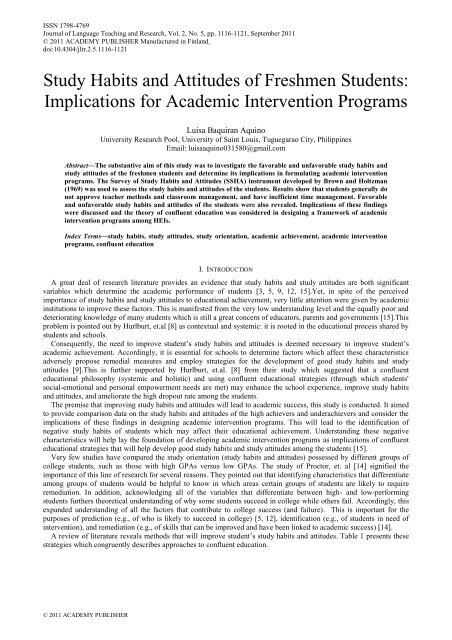Journal of Language Teaching and Research Contents - Academy ...
Journal of Language Teaching and Research Contents - Academy ...
Journal of Language Teaching and Research Contents - Academy ...
You also want an ePaper? Increase the reach of your titles
YUMPU automatically turns print PDFs into web optimized ePapers that Google loves.
ISSN 1798-4769<br />
<strong>Journal</strong> <strong>of</strong> <strong>Language</strong> <strong>Teaching</strong> <strong>and</strong> <strong>Research</strong>, Vol. 2, No. 5, pp. 1116-1121, September 2011<br />
© 2011 ACADEMY PUBLISHER Manufactured in Finl<strong>and</strong>.<br />
doi:10.4304/jltr.2.5.1116-1121<br />
Study Habits <strong>and</strong> Attitudes <strong>of</strong> Freshmen Students:<br />
Implications for Academic Intervention Programs<br />
© 2011 ACADEMY PUBLISHER<br />
Luisa Baquiran Aquino<br />
University <strong>Research</strong> Pool, University <strong>of</strong> Saint Louis, Tuguegarao City, Philippines<br />
Email: luisaaquino031580@gmail.com<br />
Abstract—The substantive aim <strong>of</strong> this study was to investigate the favorable <strong>and</strong> unfavorable study habits <strong>and</strong><br />
study attitudes <strong>of</strong> the freshmen students <strong>and</strong> determine its implications in formulating academic intervention<br />
programs. The Survey <strong>of</strong> Study Habits <strong>and</strong> Attitudes (SSHA) instrument developed by Brown <strong>and</strong> Holtzman<br />
(1969) was used to assess the study habits <strong>and</strong> attitudes <strong>of</strong> the students. Results show that students generally do<br />
not approve teacher methods <strong>and</strong> classroom management, <strong>and</strong> have inefficient time management. Favorable<br />
<strong>and</strong> unfavorable study habits <strong>and</strong> attitudes <strong>of</strong> the students were also revealed. Implications <strong>of</strong> these findings<br />
were discussed <strong>and</strong> the theory <strong>of</strong> confluent education was considered in designing a framework <strong>of</strong> academic<br />
intervention programs among HEIs.<br />
Index Terms—study habits, study attitudes, study orientation, academic achievement, academic intervention<br />
programs, confluent education<br />
I. INTRODUCTION<br />
A great deal <strong>of</strong> research literature provides an evidence that study habits <strong>and</strong> study attitudes are both significant<br />
variables which determine the academic performance <strong>of</strong> students [3, 5, 9, 12, 15].Yet, in spite <strong>of</strong> the perceived<br />
importance <strong>of</strong> study habits <strong>and</strong> study attitudes to educational achievement, very little attention were given by academic<br />
institutions to improve these factors. This is manifested from the very low underst<strong>and</strong>ing level <strong>and</strong> the equally poor <strong>and</strong><br />
deteriorating knowledge <strong>of</strong> many students which is still a great concern <strong>of</strong> educators, parents <strong>and</strong> governments [15].This<br />
problem is pointed out by Hurlburt, et.al [8] as contextual <strong>and</strong> systemic: it is rooted in the educational process shared by<br />
students <strong>and</strong> schools.<br />
Consequently, the need to improve student’s study habits <strong>and</strong> attitudes is deemed necessary to improve student’s<br />
academic achievement. Accordingly, it is essential for schools to determine factors which affect these characteristics<br />
adversely propose remedial measures <strong>and</strong> employ strategies for the development <strong>of</strong> good study habits <strong>and</strong> study<br />
attitudes [9].This is further supported by Hurlburt, et.al. [8] from their study which suggested that a confluent<br />
educational philosophy (systemic <strong>and</strong> holistic) <strong>and</strong> using confluent educational strategies (through which students'<br />
social-emotional <strong>and</strong> personal empowerment needs are met) may enhance the school experience, improve study habits<br />
<strong>and</strong> attitudes, <strong>and</strong> ameliorate the high dropout rate among the students.<br />
The premise that improving study habits <strong>and</strong> attitudes will lead to academic success, this study is conducted. It aimed<br />
to provide comparison data on the study habits <strong>and</strong> attitudes <strong>of</strong> the high achievers <strong>and</strong> underachievers <strong>and</strong> consider the<br />
implications <strong>of</strong> these findings in designing academic intervention programs. This will lead to the identification <strong>of</strong><br />
negative study habits <strong>of</strong> students which may affect their educational achievement. Underst<strong>and</strong>ing these negative<br />
characteristics will help lay the foundation <strong>of</strong> developing academic intervention programs as implications <strong>of</strong> confluent<br />
educational strategies that will help develop good study habits <strong>and</strong> study attitudes among the students [15].<br />
Very few studies have compared the study orientation (study habits <strong>and</strong> attitudes) possessed by different groups <strong>of</strong><br />
college students, such as those with high GPAs versus low GPAs. The study <strong>of</strong> Proctor, et. al [14] signified the<br />
importance <strong>of</strong> this line <strong>of</strong> research for several reasons. They pointed out that identifying characteristics that differentiate<br />
among groups <strong>of</strong> students would be helpful to know in which areas certain groups <strong>of</strong> students are likely to require<br />
remediation. In addition, acknowledging all <strong>of</strong> the variables that differentiate between high- <strong>and</strong> low-performing<br />
students furthers theoretical underst<strong>and</strong>ing <strong>of</strong> why some students succeed in college while others fail. Accordingly, this<br />
exp<strong>and</strong>ed underst<strong>and</strong>ing <strong>of</strong> all the factors that contribute to college success (<strong>and</strong> failure). This is important for the<br />
purposes <strong>of</strong> prediction (e.g., <strong>of</strong> who is likely to succeed in college) [5, 12], identification (e.g., <strong>of</strong> students in need <strong>of</strong><br />
intervention), <strong>and</strong> remediation (e.g., <strong>of</strong> skills that can be improved <strong>and</strong> have been linked to academic success) [14].<br />
A review <strong>of</strong> literature reveals methods that will improve student’s study habits <strong>and</strong> attitudes. Table 1 presents these<br />
strategies which congruently describes approaches to confluent education.

















